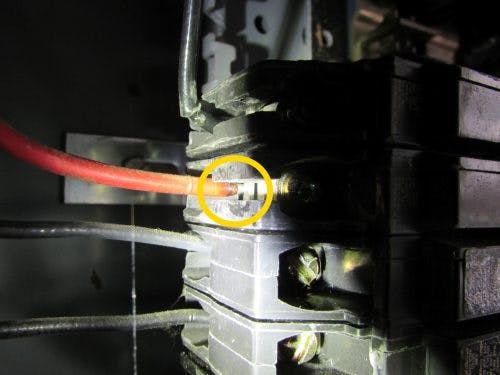Bob Blaylock
Diamond Member
- Banned
- #81
I just have a 2L v4
What kind of car do you have that has a V4? Nearly all automotive 4-cylinders are inline, not V.
Follow along with the video below to see how to install our site as a web app on your home screen.

Note: This feature currently requires accessing the site using the built-in Safari browser.
I just have a 2L v4
Here are some facts to consider lefties.
It takes around 180lbs of copper to make one electric vehicle. That is approximately 5 times more copper than it takes to make a combustion engine vehicle.
A solar farm used to generate energy used to deliver to houses takes around 5 times the amount of copper that it would take for a natural gas or coal fired or nuclear power plant.
Now try to imagine converting every last vehicle into a electric vehicles then we are going to be needing a significant amount of copper.
If they are going to build every last house and convert every last house and building in the world to run on electric solar to satisfy the largest group (millennials) demands, then we are going to be needing a whole lot more copper.
That doesn't include the amount of copper needed for the enormous wind farms.
There is literally nothing that can replace copper. According to the periodic table there is nothing that can replace it. There is only one thing that conducts electricity better and that is silver and considering how much less silver there is than copper.
Currently there is around 870,000,000 tons of copper in reserves.
There is 530,000 tons of silver in reserves.
Sigh.....
Problem with aluminum.On large-scale wiring, aluminum is used frequently instead of copper, primarily because it is more abundant and less costly than copper. Aluminum has its own issues, though. It probably isn't at all suitable for any automotive wiring application, so no help there as far as the need for copper to build electric cars. Chances are, though, that any large scale solar farm would use a lot of aluminum in place of copper.
Gold is actually better than aluminum, but like silver, it's just too expensive for this use.
Beyond aluminum, conductivity drops off rather rapidly for other metals. There are some other metals that we might be able to use for wire, in a pinch, but they would not be nearly as good as aluminum or copper.
TIBTECH innovations: Metal properties comparison: electric conductivity, thermal conductivity, density, melting temperature
Tableau comparatif des métaux: conductivité métallique et thermique, densité, résistivitéwww.tibtech.com
The National Electrical Code (NEC) only specifies copper and aluminum as suitable materials for wire.

Current ranges are 200-250 miles on a full charge
Most users will charge up before they leave home and only have to charge once a week.
No question we need more EV infrastructure to avoid situations like in the OP
Thankfully, our President included EV infrastructure in his $1.2 trillion infrastructure bill

Problem with aluminum.
Aluminum has 61 percent of the conductivity of copper, but has only 30 percent of the weight of copper. That means that a bare wire of aluminum weighs half as much as a bare wire of copper that has the same electrical resistance. Aluminum is generally more inexpensive when compared to copper conductors.
Aluminum wire is more likely to cause a fire than copper wire for many reasons: Aluminum is softer than copper, which makes it more likely to cause breaks in the wire, creating hot spots. Copper doesn't expand nearly as much as aluminum does.

Hazards with aluminum wiring
Buying a home with aluminum wiring? The seller will probably tell you it's perfectly fine, has never been a problem, and there's nothing to worry about.m.startribune.com
I recall reading somewhere that it really takes a person that understands how to install aluminum. That in itself can be problematic imo based on if aluminum is used at such a rate to supply the ginormous demand.I'm an electrician, so I know about this stuff.
Aluminum wire is perfectly fine, if it is properly installed, and used only for the correct applications.
Your link is to an article specifically about homes built from the mid 1960s to early 1970s, using aluminum for branch circuits, before we understood the hazards of it, and how to mitigate these hazards. I don't think the NEC has allowed aluminum to be used at all for branch circuits in residential applications since not long after that period, and where aluminum is used, there are certain requirements that pertain to how it is used.
I would guess that a large solar farm would be a very good application for heavy use of aluminum instead of copper; and that an electrical vehicle, which is subject to movement and vibration, would absolutely not be a good application for it.
One thing rather odd, lately, is how common aluminum-bodied flashlights and similar devices have become, given how they depend on aluminum-to-aluminum contact as part of the circuit. I suppose most non-electricians wouldn't know that Noalox is a good solution to the tendency that these devices have to become unreliable. A small amount, properly applied everywhere that contact between aluminum and aluminum, or between aluminum and any other metal, is part of the circuit, makes such devices work much better and much more reliably.
View attachment 666593
I recall reading somewhere that it really takes a person that understands how to install aluminum. That in itself can be problematic imo based on if aluminum is used at such a rate to supply the ginormous demand.
What kind of car do you have that has a V4? Nearly all automotive 4-cylinders are inline, not V.